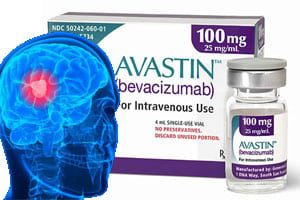
Cancer drug, Avastin (bevacizumab), did not extend survival in patients with deadly brain masses, according to an emerging study. The Roche Holding AG medication offered no advantage as a first-line therapy against glioblastoma, a type of brain cancer, according to Bloomberg News. Trials results were just presented at the American Society of Clinical Oncology meeting […]
 Cancer drug, Avastin (bevacizumab), did not extend survival in patients with deadly brain masses, according to an emerging study.
Cancer drug, Avastin (bevacizumab), did not extend survival in patients with deadly brain masses, according to an emerging study.
The Roche Holding AG medication offered no advantage as a first-line therapy against glioblastoma, a type of brain cancer, according to Bloomberg News. Trials results were just presented at the American Society of Clinical Oncology meeting in Chicago, Illinois.
Avastin is an injectable cancer medication that works by blocking a protein important for the formation of blood vessels. Tumors rely on blood vessels to receive the nutrients they need to survive; Avastin is believed to work by preventing the formation of new blood vessels that feed the tumor and is approved to treat brain, colorectal, lung, and kidney cancers.
Avastin was approved for metastatic breast cancer in February 2008 under the FDA’s accelerated approval program. But, two studies conducted by the drug’s maker later showed only a small effect on tumor growth without evidence that patients lived any longer or had a better quality of life compared to taking standard chemotherapy alone—not enough to outweigh the risk of taking the drug, the U.S. Food and Drug Administration (FDA) had said.
Avastin’s approval for use in treating breast cancer was revoked in November 2011 by the FDA after it was found the drug did not prolong life in patients diagnosed with breast cancer, Bloomberg News indicated.
As for the recent glioblastoma study, the study’s lead, Mark Gilbert, MD, a neuro-oncologist at the University of Texas MD Anderson Cancer Center in Houston said, “the bottom line is that it didn’t show any benefit as a treatment for newly diagnosed patients…. The survival benefit was not there,” according to Bloomberg News. The government-sponsored study involved 637 glioblastoma patients.
The research revealed that participants treated with Avastin and chemotherapy lived a median 15.7 months compared with 16.1 months for patients only treated with chemotherapy, according to Bloomberg News. Patients who received Avastin were also found to have an increased incidence of side effects such as hypertension, bleeding, and pulmonary embolism. Avastin is approved in the United States for glioblastoma that has returned following initial treatment; Roche seeks approval in Europe and Japan, said Bloomberg News.
Glioblastoma is a rapidly growing cancer that is seen in some 15 percent of all brain tumors, according to the American Association of Neurological Surgeons, wrote Bloomberg News. The National Cancer Institute expects some 23,130 Americans will be diagnosed with brain and nervous system cancers in 2013.
Although some brain tumor shrinkage was seen in the Avastin study, the shrinkage might actually be the drug just making blood vessels less “leaky,” Gilbert explained. By stemming the fluid, Avastin might be making brain MRIs appear better when cancer cells are, in fact, not dying, he added, according to Bloomberg News.
Roche also released its final data from a 921-patient study of Avastin as an initial glioblastoma treatment. The research also found that there was no improvement in survival in patients who were treated with Avastin first. The drug did slow how long it took for the cancer to spread (median 10.6 months from 6.2 months), wrote Bloomberg News.


